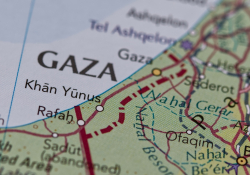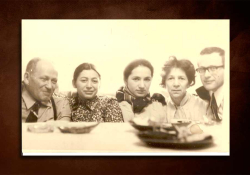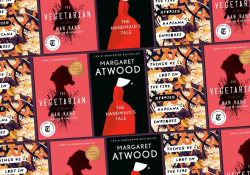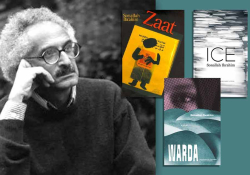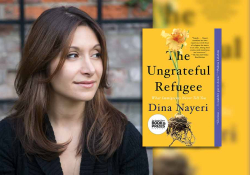To My Leaver-Mother

A left-behind daughter of the Philippines reflects on her mother’s honorable sacrifice: leaving her family behind to support them while working abroad.
Your finger dabbed my cheek to lift a fallen eyelash.
“Humiling ka,” you said. Make a wish.
I wanted to wish you would not leave us. I wanted to hear your luggage unzip, see your clothes hurl themselves back into the patinated mahogany cabinet in our shared room. I wanted to wake up the next day and find you by the stove, stirring a pot of lúgaw for breakfast, the kitchen fogged up with the spicy twang of ginger, golden steam swirling around you.
I was twelve, and my breasts had just started to bloom. My class seatmates boasted with stories about how their mothers gifted them baby bras as they were nagdadalagá na, becoming young women. It sounded terrifying and exciting at the same time. But who would I talk to about these things if you were leaving?
You said you were going to work in the Middle East as a nurse. Over there, beyond the silver horizon, Tita Weng said, you’ll find the Middle East.[i] In my dreams, I was always running, almost reaching that silver horizon.
In my dreams, I was always running, almost reaching that silver horizon.
“Your Ma will send baby bras in Balikbayan boxes for you and Regine. Toblerone chocolates too!” Tita Weng said.
You blew the eyelash off the tip of your finger, and just like that, you were gone. The first time you left, we had just entered the year of the Snake. The Gold Snake, to be exact. My cousin Cheska, a Tsinoy,[ii] said that it was going to be an auspicious year. A year of change, of becoming better. Tsinoys believed people would make wise decisions that year. Perhaps they were right: on the 20th of January, the president of the Philippines, Joseph “Erap” Estrada, was removed from office after a revolution known as People Power 2, following protests on the EDSA highway in Manila.[iii] His campaign song was a lie. All the neighborhood radio stations used to play it until I too started belting it out as I walked to school every morning: “Erap para sa mahirap!” “Erap for the poor!” When he was ousted, the adults believed the years of theft from the nation’s treasury would finally end.
“There will be more jobs,” Tita Weng said.
“Ma will come back and never leave again,” I said.
While there had been many surging tides of upheaval in Manila, the clamor in our household had a different quality on the 20th of January, as we celebrated not only my 12th birthday but also our town’s fiesta of San Sebastian. I woke up to the sound of chopping and the strong scent of onions and garlic being sautéed. Our neighbors were preparing their feasts in their backyards, and the hiss of large woks could be heard through the window. This year, like the last three years, our family could only afford a tray of pancit bihon, but our stomachs would be luggage-tight after visiting each of our neighbor’s houses and enjoying their banquets of crispy pata, caldereta, and kare-kare.
“Next year, when your Ma has saved some money in Oman, she’ll send a feast for your birthday and for the fiesta!” Tita Weng promised. But all I wanted was your home-cooked pancit bihon, the sour-tang of kalamansi squeezed all over it, and the green and orange slivers of sliced string beans and carrots topping the shiny glass noodles.
I ran to the fair just outside the village with my siblings and our neighborhood friends, past all the adults of our street gathered around the television, sipping gin and spooning pig’s brain sísig into their mouths. At the fair, we were greeted by the sour sweat of townspeople playing Colour Games, flicking peso coins on prize boards. We headed to the Horror Train where Regine and I recoiled at the clanging of the tin walls, slapped by the palms of teenage “monsters” and “zombies,” their tattered shirts crimson with the “blood” of achuete sap. A tikbalang hopped onto the carriage where Regine and I were sitting, and the tunnel shook with our screams. The tikbalang pulled back his horselike mask to reveal the face of a teenage boy, with warm eyes and a slanted scar on his chin.
“Miss, may I get your phone number?” he smirked at us, and, in a fierce reflex, Regine’s fist boxed straight into his face. Our instinctive guardian against the perils of monsters and love. He fell with a thud that was drowned out by the passengers’ cries and the rattling of our train over the rusted tracks.
Regine’s fist boxed straight into his face. Our instinctive guardian against the perils of monsters and love.
I was twelve, my sister, eleven. For the first time, somebody called us Miss. But who could we tell about such thrills?
The year of the Gold Snake came and went. I could not tell if people’s decisions truly led them toward a more auspicious life. I wondered, though, Ma, if you were happy in Oman. What were you doing as my hysterical screams vibrated down the Horror Train tunnel? Or as I licked remnants of purple yam fiesta cakes off my palms? What about that Valentine’s Day of 2001? When every man in our village held the stem of a red rose, did you receive anything from Pa? Who was with you on the other side of that silver horizon?
Ma, tell me that loneliness and solitude are not the same. Loneliness is sadness, in a landscape that is always dark, gritted and scabbed by dust storms, one that is hard to escape. Tell me that solitude is more special than that: perhaps a chosen state.
Our situation is not entirely unique to us. Labor migration has been going on for many years. Tita Weng said many other Eraps have run our country after him.[iv] Growing up in the Philippines in the 1990s to 2005, our teachers familiarized us with the term “brain drain”: decades of emigration of highly-trained Filipinos has been such a loss to the country.[v] Some who worked in low-skilled jobs abroad despite their professional qualifications in the Philippines return deskilled.
They have to go because they have no choice. Who would put food on the table? our teacher once asked.
Ma, tell me that loneliness and solitude are not the same. Even though the adults say migrants do not have a choice, you still chose to leave, right? Tita Weng said you chose not to be with us so you could provide for us. So I want to convince myself that your solitude is an act of sacrifice. And isn’t leaving the most honorable sacrifice, Ma?
That sacrifice hurls migrants like yourself into landscapes that are not only lonesome but also dangerous.[vi] I used to think that you betrayed us by leaving. A snake is slang for a person who betrays you, an English teacher once told me. But I want to think of you as a snake who symbolizes not treachery but remedy. Just like the gold snake entwined around the rod wielded by the Greek god Asclepius, the image of healing. The symbol that is usually pinned onto nurses’ chests, or engraved on doctors’ rings.
“But you’re not a snake,” Cheska said. “You’re a dragon. The New Year of 1989 started in February and not in your birth month, January.” I kicked an empty can. Who wants to be a mythical dragon, Ma? I am a snake! For I see you in that symbol: the one who sheds skin to become more resplendent, the one who leaves to rebuild. In Oman, you worked at Nizwa Hospital, learning how to speak Arabic in a month.
“Salaam Alaikum,” you taught me once in an international call. “Peace be unto you.”
“Alaikum-Salaam” (And peace be unto you), I learned to reply.
I scribbled Arabic phrases in my notebook and practiced counting in Arabic during breaks at school. Wahid. Itnan. Talata. I’d look up at a patch of blue sky beyond the tall molave trees, past the reverberation of kuliglig, and imagine you in the glinting desert dust, uttering the words that I was practicing. Perhaps in language, we can meet.
Whenever you greeted me with peace, my reply would always be, Peace unto you too. But sometimes I wonder how much peace really exists in a transnational family like ours? When one El Niño I fried some tilapia, and Regine ended up convulsing and vomiting, did you sleep in peace then? How about that time you found out that Pa, in his drunken state, had beaten up an electrician who came to cut off our electricity, leaving the man’s left eye bruised and as swollen as a caimito fruit, did you work in peace then?
I thought you were coming back to fix things. Once, I ran toward loud knocking on the door but did not find you on the other side. Two bulky policemen stood in front of me, blocking out the daylight. Regine and I had to answer to them as they looked for Pa. “If your mother’s working abroad, why can’t your father even pay the bills?” one of them asked.
Left-behinds like us must grow up fast, must persevere especially in the absence of peace.
Tell me, Ma—that left-behinds like us must grow up fast, that we must persevere especially in the absence of peace.[vii] To perform what our parents could not. And to tell our parents only the good things about our lives, leaving out the not-so-good so that even if we’re far apart, we could give them peace.
So whenever you called us, we would say how bright our summer was, how the guava fruits in the yard turned from yellow to pink and started dropping to the ground with such overripe hope. I never talked about bad things. Once, a girl who sat behind me in class kept kicking my chair and sticking chewing gum in my hair. When our teacher made us clean toilets and she kept “accidentally” poking my leg with a bowl plunger, the rubber mouth making a wet sucking noise on my ankles, I jumped on her, tugging her long black hair, until the tiled walls echoed with our classmates’ shouting. I yanked on her collar, exposing her budding chest to the whole class. Since, I never felt my chair shake from her kicking again.
“Peace be unto you too.”
Ma, teach me more Arabic phrases, tell me your story. How you were sent by your hospital to the mountains of Jebel Kawr in Oman, on a medical mission. How you rocked on the back of a camel as the sun baked the desert in gold. You stopped by a river and kneeled to see your own reflection, lowering your hands to the ice-cold waters from the mountain peaks. You filled up your gourd bottle, drank, and filled it up again.
Later that night, you reached a small village carved from rocks, and the full moon bloomed in the sea of dark linctus in the spoons you coaxed sick children to swallow. The air cooled as you wrapped a bandage around a girl’s sprained foot. You hoisted her onto your lap, pointed at a far-off herd of white antelopes. I want to convince myself that by tending to those children, you tended to us from a distance.
Peace be with you.
Wolverhampton, UK
Editorial note: “Poetry and Nursing in the Filipino Diaspora,” Ante’s interview with Marianne Chan, appeared earlier this summer on the WLT Weekly.
[i] Tita means “auntie.”
[ii] Tsinoy refers to Chinese-Filipinos.
[iii] The first People Power Revolution had taken place fifteen years beforehand, when Ferdinand Marcos was ousted from power and exiled. Estrada was charged with plunder and later convicted.
[iv] The Philippines has become one of the top sources of migrant laborers for the world and has been described by the BBC News as the country “training their people to leave.” Every day, five thousand Filipinos leave to work abroad, and a large proportion of these migrants are women. In a report published in 2016, United Nations Women stated that the number of hired women migrant workers or WMWs reached its peak in 2014, when 75 percent of newly deployed workers were female.
[v] Some Overseas Filipino Workers are professionals (i.e., teachers, nurses, etc.) who go to other countries (i.e., Hong Kong, the Middle East, Japan) to work in a lower-skilled employment such as being nannies, entertainers, etc.
[vi] Joanna De Mafelis, a Filipino maid in Kuwait, was found mutilated in her employer’s freezer in 2018. In 2014 Filipino nurses working in a private nursing home in Wiltshire, England, were rescued following abuse, racism, and exploitation. In a report published by The Independent, one of the Filipino nurses, Nemia Labergas, was quoted saying that ten of her colleagues were given accommodation miles from their workplace, in a four-bedroom house with only one bathroom. She told the reporter, “They said that we were used to living like rats in the Philippines.”
[vii] Left-behind children is a sociological term that describes children left by their parents (sometimes to their grandparents, sometimes alone) as the latter work in other cities or countries in order to provide for the family. In 2018 there were nine million left-behind children in the Philippines; their parents were Overseas Filipino Workers.



